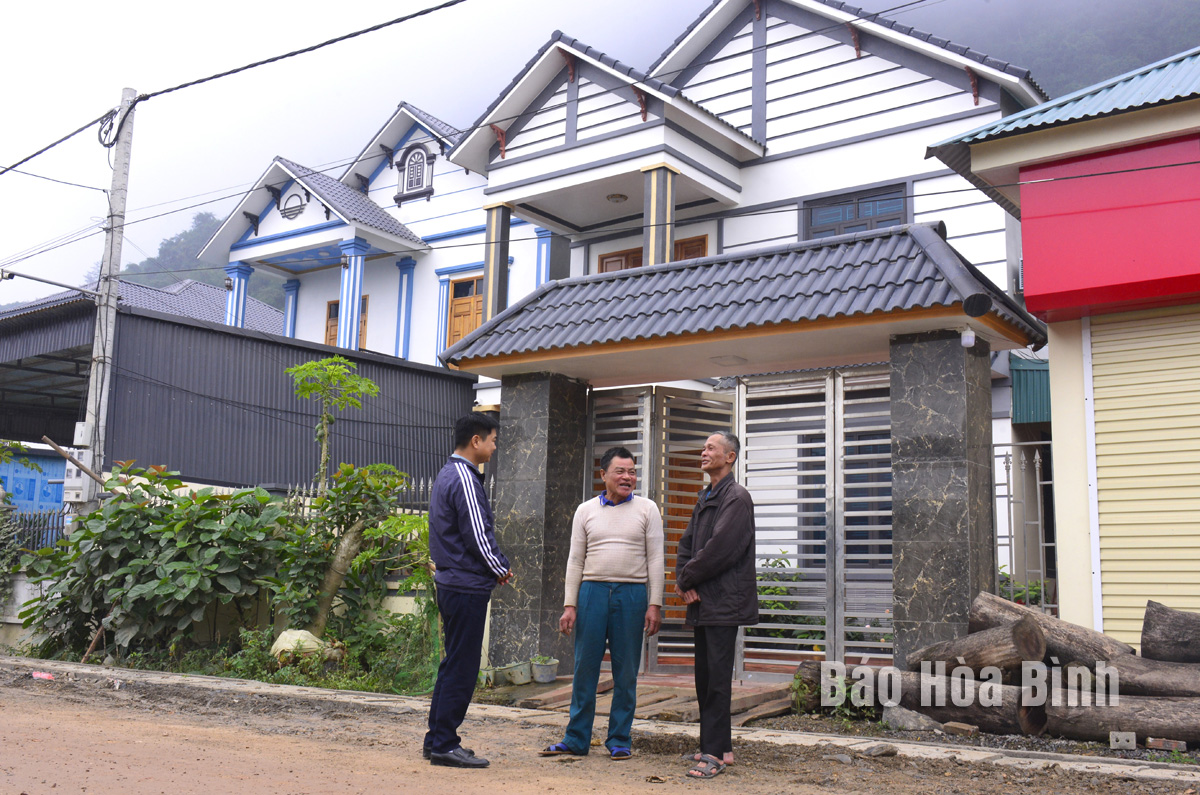
The new Nhun hamlet in Yen Phu commune, Lac Son district is one of the eight resettlement areas in the Canh Tang reservoir project, while the old Nhun hamlet is now submerged. The hamlet, about three kilometres away from the commune’s centre, is now home to more than 100 households.
Part of the Nhun resettlement area in Yen Phu commune, Lac Son district.
Almost all houses in the resettlement area are permanent houses built at a cost of at least 1 billion VND (41,000 USD) each. In 2029, the district and commune authorities called on people in the former Nhun hamlet to relocate to make room for the construction of the Canh Tang reservoir.
About 100 households were arranged in the resettlement area with sufficient infrastructure including concrete roads, lighting systems, and community houses. Each household was allocated 400 sq.m of land to build a house.
Bui Van Binh, the land management official of Yen Phu commune said that the commune has two resettlement areas for people relocated for the reservoir, which are Da Moi and Nhun hamlets. He said that at the beginning of the relocation, people did not want to go far from their fields and ancestors' graves. However, the entire political system including cadres, Party members, and prestigious persons joined hands to persuade people to follow the Government’s policy. Meanwhile, relevant units and investors implemented solutions to remove difficulties in compensation.
The Canh Tang reservoir project is one of the four key projects of the Ministry of Agriculture and Rural Development and a key project of the province. It is considered a major irrigation project in the North, with a capacity of about 91 million cubic metres. A total of 652 households had to move for the reservoir’s construction.
The Lac Son district People's Committee built eight resettlement areas for people in eight hamlets of three communes - Van Nghia, Binh Hem, and Yen Phu.
With just over a month left until the school summer break, students are eagerly anticipating a period of rest and fun after a year of academic pressure. To provide a healthy environment for the physical development, in addition to the classes that foster talents and enhance the academic knowledge, sports and physical activities continue to attract a large number of children and teenagers.
On April 17th, Hoa Binh Provincial Museum organized a program to promote and introduce the outstanding values of "Hoa Binh Culture” at the Boarding Secondary and High School for ethnic minority students in Mai Chau District.
The Hoa Binh College of Technical Technology, in collaboration with the Hoa Binh Technical and Economic College and the provincial Association of Literature and Arts, hosted a gathering on April 15 to celebrate Laos’ traditional Bunpimay (New Year) Festival 2025 and debut the new book "Nguoi Muong o ban Don” (Muong people in Don village).
In the millennia-long history of national construction and safeguarding, people of all ethnic groups in Hoa Binh have been united and closely bound together to overcome all difficulties and challenges, standing alongside the entire Vietnamese people throughout the history of building and defending the country.
Living green is a healthy, positive, and sustainable lifestyle that not only helps protect
the environment and quality of life but also conserves natural resources and ecosystems.
Among the many ways to embrace this lifestyle, reducing plastic consumption is one of the most impactful.
The women's unions at all levels in Kim Boi district have been making significant contributions to the movement of building cultural life in the local community.
The movement helps improve rural look and the spiritual and material lives of local residents.



